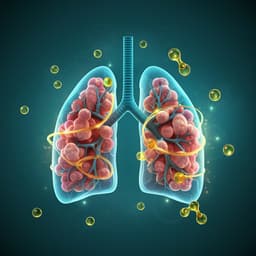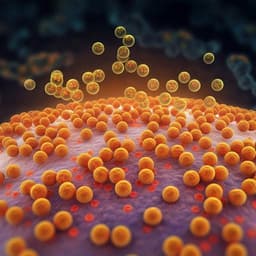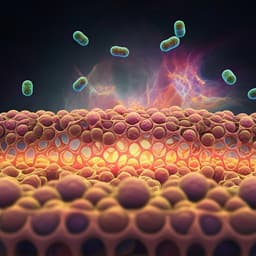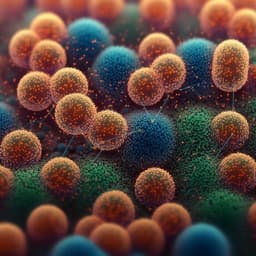
Medicine and Health
The gut microbiome-prostate cancer crosstalk is modulated by dietary polyunsaturated long-chain fatty acids
G. Lachance, K. Robitaille, et al.
The study investigates whether the gut microbiota influences prostate cancer (PCa) development and progression in patients not receiving androgen deprivation therapy (ADT). Prior work has focused mainly on microbiome effects on treatment response (e.g., ADT-induced microbial androgen synthesis and associations with Akkermansia muciniphila), leaving unclear if microbiota changes relate to tumor burden and aggressiveness in untreated disease. Given epidemiologic and experimental evidence that diet, especially fat quality (saturated vs polyunsaturated), modulates PCa risk and progression, and that gut microbes regulate fatty acid assimilation and produce metabolites such as short-chain fatty acids (SCFAs), the authors hypothesize a bidirectional crosstalk between PCa and gut microbiota. They further posit that long-chain n-3 polyunsaturated fatty acids (LCn3), such as EPA and DHA, may beneficially modulate this crosstalk by altering microbial composition and metabolism to slow PCa growth and aggressiveness.
- Correlative studies report differences in gut microbiota between healthy individuals and PCa patients; tumor-derived bacterial sequences overlap with taxa present in stool, suggesting a possible influence of gut microbes on prostate tumors.
- ADT can reshape gut microbiota; commensals (e.g., Ruminococcus spp.) may synthesize androgens from precursors, fueling castration resistance; abiraterone use is associated with enrichment of Akkermansia muciniphila and better immunotherapy responses in some cancers.
- Diet is implicated in PCa: animal/saturated fats associate with higher risk of lethal PCa, whereas plant polyunsaturated fats and omega-3-rich patterns (e.g., Mediterranean diet) associate with reduced mortality. High-fat diets exacerbate PCa aggressiveness in mouse models; omega-3 intake reduces PCa progression in mice.
- Gut microbiota regulate lipid absorption and metabolism; hypercaloric diets increase intestinal permeability and endotoxemia, promoting inflammation. SCFAs from gut bacteria can modulate host immunity and cancer biology, but their roles may be context-dependent.
Human studies:
- Cohort 1 (pre-prostatectomy): 62 men with localized PCa (ISUP Grade Group ≥2) provided fecal samples ~5.0±0.5 weeks before radical prostatectomy. Tumor volume at prostatectomy was estimated (percent cancer area × prostate weight) and patients stratified into tertiles (low/medium/high) of tumor burden. 16S rRNA V3–V4 sequencing was used to profile gut microbiota; alpha (Shannon) and beta (Bray–Curtis, PCA) diversity assessed; taxonomic relative abundances compared (Welch’s t-tests; Permanova for beta diversity).
- Cohort 2 (post-prostatectomy): 47 men ~5.2±1.0 years after RP, grouped by PSA: no BCR (undetectable), low PSA (0.05–0.49 ng/mL), or high PSA (mean 2.96±0.46 ng/mL). 16S rRNA profiling and diversity analyses as above; phylum-level differences assessed.
- Randomized clinical trial sub-cohort: 41 men from a phase IIb double-blind RCT (NCT02333435) received daily MAG-EPA (3 g/day) or placebo HOSO for 7.2±0.37 weeks before RP. Fecal samples collected at baseline and pre-surgery. Outcomes: change in Grade Group (upgrade/downgrade/no change), fecal 16S profiles (focus on Ruminococcaceae), and fecal SCFAs via GC-FID (butyric, acetic, propionic, valeric, isobutyric, isovaleric). qPCR assays targeted bacterial taxa and SCFA-synthesis enzymes. Statistics: Chi-square for grade change distribution; paired Wilcoxon and Welch’s t-tests for microbial/SCFA changes.
Mouse models:
- TRAMP-C2 model (C57BL/6N males): subcutaneous injection of 2×10^6 TRAMP-C2 cells; fecal sampling at baseline, minimal palpable mass, active growth, and endpoint (2 cm^3). 16S rRNA sequencing, alpha/beta diversity analyses; differential taxa assessed; PICRUSt used to predict functional pathway alterations.
- Genetically engineered tumor models (C57BL/6J): s.c. injection of murine PCa cells with Pten−/−;Rb1fl/fl or Pten−/−;Rb1−/−; fecal sampling ~4 weeks post-injection; 16S profiling and diversity analyses; PICRUSt pathway predictions; comparison to tumor-free controls.
- Fecal microbiota transplantation (FMT): Antibiotic-depleted C57BL/6N mice (ampicillin in water; streptomycin and colistin gavage, 8 days, then 48 h washout) received two weekly gavages of fecal suspensions from six independent PCa patients (Grade Group 2–5) or autologous mouse pre-antibiotic feces (control). After FMT, mice were implanted with TRAMP-C2 cells; tumor mass measured at 5 weeks. Microbial depletion verified by fecal DNA yield and anaerobic culture.
- PUFA supplementation: C57BL/6N mice gavaged daily for 2 weeks before and through tumor growth with purified monoglyceride PUFA: MAG-EPA (n-3), MAG-DHA (n-3), MAG-AA (n-6), or HOSO (n-9 control). TRAMP-C2 tumor growth monitored; fecal microbiome profiled; Ruminococcaceae validated by qPCR.
Microbiome/functional analyses:
- 16S rRNA V3–V4 library prep and Illumina MiSeq sequencing; bioinformatics via Mothur with SILVA/Greengenes references; rarefaction at 3,676 reads/sample; OTU clustering at 97% identity; contaminant and chimera removal. Alpha diversity in PAST; beta diversity and PCA via MicrobiomeAnalyst; differential abundance and functional predictions via STAMP and PICRUSt. KEGG pathways examined; manual curation identified enzymes linked to LCFA metabolism (enoyl-CoA hydratase, aldehyde dehydrogenase, 3-hydroxyacyl-CoA dehydrogenase).
SCFA quantification:
- Human fecal homogenates analyzed by GC-FID with standards; duplicates averaged.
Statistics:
- Two-sided Student’s or Welch’s t-tests, Wilcoxon tests, Permanova, Chi-square; significance threshold p≤0.05; data reported as mean±SEM unless stated.
- In pre-prostatectomy patients (n=62), fecal microbiota alpha diversity (Shannon) was 8.3±2.6% lower in the highest tumor volume tertile vs lowest (p=0.02); no significant beta diversity shift by PCA (p=0.48).
- In post-prostatectomy patients (n=47), high PSA (mean 2.96±0.46 ng/mL) displayed major phylum shifts: Firmicutes relative abundance higher by 21.7±1.5% vs low PSA and 18.1±1.2% vs undetectable PSA (p=0.04). Bacteroidetes relative abundance was 91±11% lower in high PSA vs no BCR. Alpha diversity reduced by 17.9±3.1% (vs undetectable) and 13.3±4.1% (vs very low PSA) (p=0.02); beta diversity significantly shifted (Permanova p=0.03).
- TRAMP-C2 mouse model: Bacteroidetes increased by ~74±7% (active growth) and 71±8% (endpoint) vs baseline; alpha diversity decreased by ~14–16% at active growth and endpoint. Beta diversity separated active growth/endpoint from baseline/minimal mass (Permanova p=0.001).
- Pten/Rb1 models: Pten−/−;Rb1−/− tumors showed a 20±5% Firmicutes increase and 48±14% Actinobacteria reduction vs controls; alpha diversity reduced by 19±8% (p=0.02); significant beta diversity differences (p=0.02).
- FMT from six PCa patients into antibiotic-depleted mice increased TRAMP-C2 tumor mass vs autologous mouse FMT in 4 of 6 donor groups: +127±4% (p=0.006), +199±13% (p=0.007), +247±26% (p=0.04), +166±15% (p=0.01). Lower viable fecal bacteria recovered after FMT from high tumor volume/low-diversity donors (−39±16% vs medium volume donors; p=0.03).
- Common functional signatures (PICRUSt) across three mouse models at endpoint identified seven KEGG pathways altered; manual curation pinpointed three enzymes involved in LCFA β-oxidation (enoyl-CoA hydratase, aldehyde dehydrogenase, 3-hydroxyacyl-CoA dehydrogenase), implicating microbial LCFA metabolism in PCa-associated microbiome changes.
- PUFA supplementation in mice: MAG-DHA reduced TRAMP-C2 tumor growth by 45±10% vs HOSO (p=0.04); MAG-EPA showed a similar trend. Ruminococcaceae abundance decreased by 52±6% (MAG-DHA) and 43±9% (MAG-EPA) vs HOSO (p=0.008); baseline microbiota similar across groups.
- Clinical RCT sub-cohort (n=41): MAG-EPA associated with 71% less Grade Group upgrading vs placebo (p=0.016). MAG-EPA reduced fecal Ruminococcaceae by 12±5% relative abundance between pre- and post-treatment (paired Wilcoxon p=0.046). Patients with upgrading had 27±3% higher Ruminococcaceae vs stable grade (p=0.004).
- SCFAs: MAG-EPA reduced fecal butyric acid by ~1.5-fold vs placebo (p=0.04); similar trend for valeric acid. Patients with downgrading showed ~2-fold lower enrichment in fecal butyrate over time vs no change (p=0.002). In the post-RP cohort, fecal butyrate was 72±14% higher in high PSA BCR vs no BCR (p=0.02).
- Overall, findings support a bidirectional crosstalk where PCa burden/aggressiveness associates with reduced alpha diversity and specific taxonomic/functional shifts; omega-3 LCn3 supplementation modulates gut microbes (notably Ruminococcaceae) and metabolites (butyrate), reducing tumor growth and aggressiveness.
The study demonstrates that gut microbiota composition correlates with PCa tumor volume and aggressiveness in patients not exposed to ADT and in multiple mouse models. Reduced alpha diversity accompanies greater tumor burden and aggressive genotypes (Pten−/−;Rb1−/−), and human-to-mouse FMT experiments establish a causal contribution of patient microbiota to enhanced tumor growth. Functional predictions converge on microbial LCFA metabolism, suggesting tumor-driven selection or modulation of bacterial pathways linked to fatty acid degradation. Dietary intervention with LCn3 (MAG-EPA/DHA) mitigated tumor growth in mice and reduced upgrading in patients, accompanied by decreased fecal Ruminococcaceae and butyrate. These data indicate that omega-3-mediated modulation of gut microbes and their metabolites can beneficially influence PCa biology. The association of higher fecal butyrate with early metastatic disease and reduction after MAG-EPA suggests butyrate may act as a mediator of the microbiome–PCa axis, potentially via immune modulation (e.g., Treg induction) and systemic metabolic effects. While butyrate has context-dependent effects in cancer, lowering gut-derived butyrate might alleviate immunosuppression in the PCa microenvironment and could synergize with immunotherapies (e.g., anti-CTLA-4). The lack of a conserved taxonomic signature across cohorts underscores inter-individual variability and baseline differences between mouse facilities, highlighting the value of functional and metabolite readouts. Collectively, the findings support targeting the gut microbiome through diet to modulate PCa progression.
This work establishes a bidirectional crosstalk between PCa and the gut microbiome: greater tumor burden/aggressiveness associates with decreased alpha diversity and specific microbial and functional changes; patient-derived microbiota can accelerate tumor growth in mice. Functional predictions implicate microbial LCFA metabolism. Omega-3 LCn3 supplementation (MAG-EPA/DHA) reduces tumor growth and pathological upgrading, associated with decreased Ruminococcaceae and fecal butyrate, identifying a potential mechanistic axis linking diet, microbiota, metabolites, and PCa. Future directions include: validating mechanistic roles of specific taxa (e.g., Ruminococcaceae) and metabolites (butyrate) via targeted microbial manipulation and metabolite modulation; longitudinal and paired multi-omics (metagenomics, metatranscriptomics, metabolomics) to define conserved functional signatures; delineating host immune pathways influenced by microbiota-derived SCFAs in PCa; and testing whether LCn3-driven microbiome modulation augments responses to systemic therapies, including immunotherapies.
- Human microbiota exhibits high inter-individual variability, limiting identification of a conserved taxonomic signature; functional convergence was more evident than taxonomic consistency.
- Baseline microbiota differed between mouse facilities and models, potentially affecting comparability and detection of consistent taxa changes.
- Some statistical values in text appear truncated due to formatting (e.g., certain p-values), though overall trends were consistent.
- FMT engraftment efficiency may vary; lower microbial diversity in some human donors appeared to reduce viable bacterial transfer, possibly blunting tumor effects.
- 16S rRNA profiling infers function (PICRUSt) rather than measuring it directly; shotgun metagenomics/metabolomics would strengthen mechanistic claims.
- Clinical trial fecal sub-cohort size (n=41) limits power for subgroup analyses; short intervention duration (~7 weeks) may not capture longer-term effects.
- Potential confounders (e.g., peri-procedural antibiotics at biopsy/surgery) were similar across patients but could still influence microbiota composition.
Related Publications
Explore these studies to deepen your understanding of the subject.







